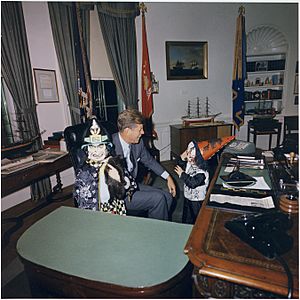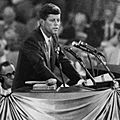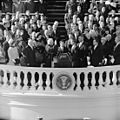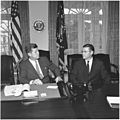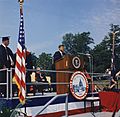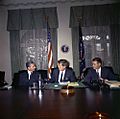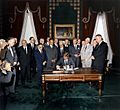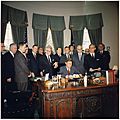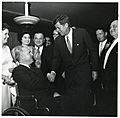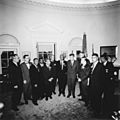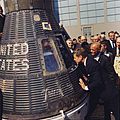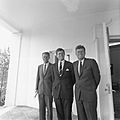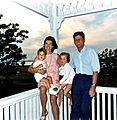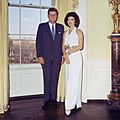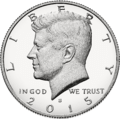John F. Kennedy facts for kids
Quick facts for kids
John F. Kennedy
|
|
|---|---|
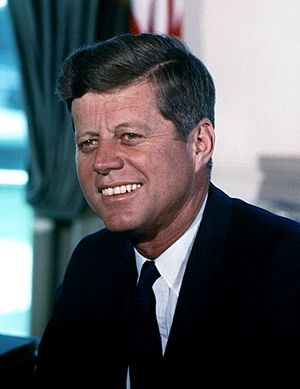 |
|
| 35th President of the United States | |
| In office January 20, 1961 – November 22, 1963 |
|
| Vice President | Lyndon B. Johnson |
| Preceded by | Dwight D. Eisenhower |
| Succeeded by | Lyndon B. Johnson |
| United States Senator from Massachusetts |
|
| In office January 3, 1953 – December 22, 1960 |
|
| Preceded by | Henry Cabot Lodge Jr. |
| Succeeded by | Benjamin A. Smith II |
| Member of the U.S. House of Representatives from Massachusetts's 11th district |
|
| In office January 3, 1947 – January 3, 1953 |
|
| Preceded by | James Michael Curley |
| Succeeded by | Tip O'Neill |
| Personal details | |
| Born |
John Fitzgerald Kennedy
May 29, 1917 Brookline, Massachusetts, U.S. |
| Died | November 22, 1963 (aged 46) Dallas, Texas, U.S. |
| Cause of death | Assassination (gunshot wound to the head) |
| Resting place | Arlington National Cemetery |
| Political party | Democratic |
| Spouse | |
| Children | 4 (including John Jr. and Caroline) |
| Parents | Joseph P. Kennedy Sr. Rose Fitzgerald |
| Relatives | See Kennedy family |
| Education | Harvard University (BA) Stanford University |
| Signature | |
| Military service | |
| Allegiance | |
| Branch/service | |
| Years of service | 1941–1945 |
| Rank | |
| Unit | Motor Torpedo Squadron 2 • Patrol Torpedo Boat 109 • Patrol Torpedo Boat 59 |
| Battles/wars | World War II • Solomon Islands campaign |
| Awards | |
John Fitzgerald Kennedy (May 29, 1917 – November 22, 1963), often called JFK or Jack, was the 35th President of the United States. He served as president from 1961 until his death in 1963. He was the youngest person ever elected president at 43 years old. During his time in office, important events happened like the Cuban Missile Crisis, the building of the Berlin Wall, and the start of the Space Race. He was also the youngest U.S. President to die while in office.
Contents
Early Life and Family
John F. Kennedy was born in Brookline, Massachusetts, on May 29, 1917. He was the second of nine children in his family. His father, Joseph P. Kennedy Sr., was a successful businessman. He later became a U.S. ambassador to the United Kingdom. John's mother was Rose Fitzgerald.
Education and Military Service
Kennedy went to Harvard University and earned a degree in International Relations. Before World War II, he tried to join the U.S. Army. However, he was not accepted due to back problems. Instead, he joined the Navy.
During the war, his PT boat was hit by a Japanese destroyer in 1943. He hurt his back badly but still managed to save his crew members. For his bravery, he received a medal.
Family Life
After the war, Kennedy entered politics. He was elected to the U.S. Congress in 1946. Then, he became a U.S. Senator in 1952.
He married Jacqueline Bouvier on September 12, 1953. They had four children together. Their daughter, Caroline, was born in 1957. Their son, John, was born in 1960. They also had a daughter who was stillborn in 1956 and a son named Patrick who lived for only two days in 1963.
Becoming President
Kennedy was a member of the Democratic Party. In the 1960 presidential election, he ran against Richard Nixon. Kennedy won the election and became the youngest president ever elected. He was also the first Roman Catholic president. He was known for being a great speaker. He inspired many young Americans.
Key Challenges and Decisions
Early in his presidency, Kennedy faced a major challenge. The CIA had a plan to invade Cuba. This plan failed, which led to the Cuban Missile Crisis. During this crisis, Cuba received many nuclear missiles from the Soviet Union. This was a very tense time, and the world was close to a nuclear war.
President Kennedy ordered U.S. Navy ships to surround Cuba. He worked to end the crisis peacefully. He made an agreement with the Soviet Union. The Soviet Union agreed to stop sending nuclear weapons to Cuba. In return, the U.S. agreed to remove its missiles from Turkey and promised not to invade Cuba.
New Ideas for America
Kennedy also started programs called the New Frontier. These programs aimed to help people who were struggling. They included plans for urban renewal and support for poor and working class families.
He created the Peace Corps to help people in poor countries around the world. He also pushed for a large tax cut to help the economy. Kennedy strongly supported the Civil Rights Act of 1964. This law would make discrimination and segregation illegal. He also wanted to improve relations with Cuba and reduce military involvement in Vietnam.
His Assassination
President Kennedy was killed on November 22, 1963. This happened in Dallas, Texas. He was riding in an open-top car with the Governor of Texas, John Connally, and their wives. As the car drove through Dealey Plaza, shots were fired. Kennedy was shot in the throat and head. He was rushed to Parkland Memorial Hospital but was pronounced dead at 1:00 p.m.
Lee Harvey Oswald, a former U.S. Marine, was the main suspect. He was arrested the same day for killing a policeman named J. D. Tippit. Oswald said he did not shoot anyone. Two days later, on November 24, Oswald was killed by Jack Ruby.
Kennedy had a state funeral on November 25, near the White House. He was buried in Arlington National Cemetery in Arlington, Virginia.
His Legacy
After Kennedy's death, Lyndon Johnson, his Vice President, became president. Johnson worked to pass many of Kennedy's ideas into law. These laws were part of what was called the Great Society.
John F. Kennedy was a very popular president. He is still remembered as one of America's greatest leaders. Many public surveys and opinion polls rank him highly.
Famous Quotes by John F. Kennedy
- "Ask not what your country can do for you, but what you can do for your country."
- "Do not pray for easy lives, pray to be stronger men."
- "Those who dare to fail miserably can achieve greatly."
- "Every accomplishment starts with the decision to try."
Interesting Facts About John F. Kennedy
- John F. Kennedy wrote two books about World War II.
- In school, he played baseball as a pitcher and third baseman.
- JFK was a Boy Scout for two years in Bronxville, New York.
- He smoked 4-5 cigars every day.
- The first bill he signed into law restored military rank to former President Dwight_D._Eisenhower.
- While in the White House, his family had many pets. These included two parakeets, three dogs, and two ponies.
- His family was very wealthy. JFK was one of the richest presidents in U.S. history.
- His father, Joseph Kennedy, was not hurt in the famous 1920 Wall Street bombing.
- JFK had several health problems, including Addison's disease.
Images for kids
-
The Kennedy family in Hyannis Port, Massachusetts, with JFK at top left in the white shirt, 1931
-
Lieutenant (junior grade) Kennedy (standing at right) with his PT-109 crew, 1943
-
Kennedy endorsing Adlai Stevenson II for the presidential nomination at the 1956 Democratic National Convention in Chicago
-
Kennedy and Richard Nixon participate in the nation's second televised presidential debate, Washington, D.C., 1960
-
Chief Justice Earl Warren administers the presidential oath of office to John F. Kennedy at the Capitol, January 20, 1961.
-
Kennedy with retired president Dwight D. Eisenhower at Camp David
-
Kennedy confers with Attorney General Robert Kennedy, October 1962
-
Kennedy signs the Proclamation for Interdiction of the Delivery of Offensive Weapons to Cuba in the Oval Office, October 23, 1962
-
Kennedy and Secretary of Defense Robert McNamara, 1962
-
Kennedy delivers the commencement speech at American University, June 10, 1963
-
Kennedy delivering his speech in West Berlin
-
Kennedy with Israeli Foreign Minister Golda Meir, December 27, 1962
-
Shah Mohammad Reza Pahlavi of Iran, Kennedy, and U.S. Defense Secretary Robert McNamara in the White House Cabinet Room on April 13, 1962
-
Kennedy's motorcade through Cork, Ireland on June 28, 1963
-
Kennedy signs the Partial Test Ban Treaty, a major milestone in early nuclear disarmament
-
Kennedy signing the Manpower Development and Training Act, March 1962
-
Thurgood Marshall, appointed to the United States Court of Appeals for the Second Circuit by Kennedy in May 1961
-
Kennedy with Boston Mayor John F. Collins (1960–1968) and his wife. On November 20, 1962, Kennedy issued Executive Order 11063 requiring all federal agencies to prevent racial discrimination in federally-funded subsidized housing in the United States.
-
Kennedy's Report to the American People on Civil Rights, June 11, 1963
-
Kennedy meetings with leaders of the March on Washington in the Oval Office, August 28, 1963
-
Accompanied by astronaut John Glenn, Kennedy inspects the Project Mercury capsule Friendship 7, February 23, 1962
-
Wernher von Braun and Kennedy
-
President Kennedy's family leaving his funeral at the U.S. Capitol Building
-
The Kennedy brothers: Attorney General Robert F. Kennedy, Senator Ted Kennedy, and President John F. Kennedy in 1963
-
The First Family in Hyannis Port, Massachusetts, 1962
-
Attorney General Robert F. Kennedy, Marilyn Monroe, and John Kennedy talk during the president's May 19, 1962, early birthday party, where Monroe publicly serenaded Kennedy with "Happy Birthday, Mr. President"
-
The Kennedy half dollar was first issued in 1964
-
Official White House portrait of John F. Kennedy, by Aaron Shikler
-
President's and his wife's graves at John F. Kennedy Eternal Flame memorial, Arlington National Cemetery
See also
 In Spanish: John F. Kennedy para niños
In Spanish: John F. Kennedy para niños
 | May Edward Chinn |
 | Rebecca Cole |
 | Alexa Canady |
 | Dorothy Lavinia Brown |


